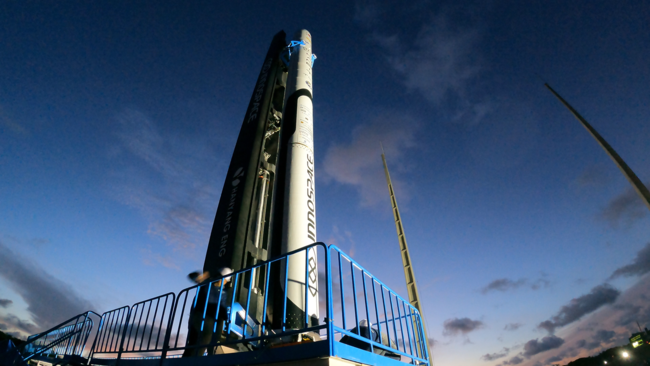Aerospace & Defense
Startup Innospace launches Korea’s first private projectile
Experts say it is important to secure top technology and slash costs to succeed in the business of launch vehicles for small satellites
By Mar 20, 2023 (Gmt+09:00)
3
Min read
Most Read
LG Chem to sell water filter business to Glenwood PE for $692 million


KT&G eyes overseas M&A after rejecting activist fund's offer


Kyobo Life poised to buy Japan’s SBI Group-owned savings bank


StockX in merger talks with Naver’s online reseller Kream


Meritz backs half of ex-manager’s $210 mn hedge fund



South Korean space startup Innospace said on Monday it has launched a suborbital test projectile, the country’s first private launch vehicle, raising hopes that the civilian industry may speed up the development of the nation’s aerospace industry.
Innospace fired the HANBIT-TLV from the Alcântara Launch Center operated by the Brazilian Air Force in the northern part of the South American country at 2:52 p.m. Sunday local time.
“It seemed to have been launched without any issues seen from the naked eye,” said a company official.
The HANBIT-TLV was flying toward the sky without any problems after taking off in flames, according to a video clip released by the Brazilian Air Force.
The success of the projectile’s launch will be confirmed after analysis of related data such as the normal operation of the engine.
“We are now verifying the flight performance of the engine and its payloads,” Innospace said. “We will announce the final result of the launch later.”
Once successful, the HANBIT-TLV will become South Korea’s first private projectile that reaches an altitude of 100 kilometers, considered the starting point of outer space. A suborbital flight determines the technological competitiveness of projectile makers.
SPACE ERA TO BE OPENED BY PRIVATE SECTOR
The HANBIT-TLV is expected to achieve a breakthrough in South Korea’s private space industry.
The civilian sector has yet to make any remarkable achievements although the country succeeded in the launch of a homegrown space rocket carrying payloads last year to become the world’s seventh country with advanced aerospace technology. The government is also seeking a new growth engine from the space industry for Asia's fourth-largest economy.
Companies in developed countries are running far ahead of South Korean firms. For example, US SpaceX launched Falcon 1 in 2008, opening the space era led by the private sector.
Innospace, founded and led by Kim Soo Jong, a former rocket researcher at a private defense maker, is developing launch vehicles for small satellites. The company aims to introduce a commercial model after success in the HANBIT-TLV to capture growing demand in the small projectile market.
It is essential for the business to raise the success rate of launches and cut costs, experts said.
“About 180 companies worldwide are targeting the market. To make profits, they need to secure technology and cost competitiveness equivalent to those of the top eight companies including SpaceX,” said Lee Changjin, a professor of the Department of Aerospace Engineering at Konkuk University in Seoul.
“They need not only the success in the launch but also the chance of winning in the business.”
HYBRID ROCKET
The HANBIT-TLV is to validate the first stage engine of the HANBIT-Nano, a two-stage small satellite launcher capable of carrying a 50-kilogram payload. The HANBIT-TLV is a 15-ton thrust single-stage hybrid rocket with a height of 16.3 meters, a diameter of 1 meter and a weight of 8.4 tons.
It has a hybrid engine with a simple structure that can control detailed thrust. The engine can utilize the advantages of both solid fuels suitable for space projectiles and liquid fuels for engine thrust controls.
The HANBIT-TLV also carries onboard the payload SISNAV, an internal navigation system developed by the Brazilian Department of Aerospace Science and Technology (DCTA).
Innospace had planned to launch the projectile in December last year but postponed the test three times due to bad weather and an unexpected synchronization error.
Write to Joo-Wan Kim and Da Eun Choi at kjwan@hankyung.com
Jongwoo Chon edited this article.
More to Read
-
 Aerospace & DefenseS.Korea to lure global talent with high pay for space agency
Aerospace & DefenseS.Korea to lure global talent with high pay for space agencyFeb 16, 2023 (Gmt+09:00)
2 Min read -
 Aerospace & DefenseS.Korean President Yoon to lead national space policy
Aerospace & DefenseS.Korean President Yoon to lead national space policyNov 28, 2022 (Gmt+09:00)
3 Min read -
 Aerospace & DefenseLaunch of Innospace's Hanbit-TLV rocket called off due to technical glitch
Aerospace & DefenseLaunch of Innospace's Hanbit-TLV rocket called off due to technical glitchDec 23, 2022 (Gmt+09:00)
1 Min read -
 Aerospace & DefenseS.Korea ushers in new space era with rocket launch success
Aerospace & DefenseS.Korea ushers in new space era with rocket launch successJun 21, 2022 (Gmt+09:00)
3 Min read
Comment 0
LOG IN


